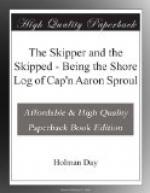“It’s my idee of a rooster-fight,” retorted Reeves. In his triumph he was not unwilling to banter repartee with the hateful Hiram. “You fellers with what you call sportin’ blood”—he sneered the words—“come along and think nobody else can’t do anything right but you. You fetch along cat-meat with feathers on it”—he pointed at the vanquished P.T.—“and expect it to stand any show with a real fighter.” Now he pointed to the Widow Pike’s rooster sauntering away with his harem about him. “He ain’t rid’ around with a circus nor followed the sportin’ life, and he’s al’ays lived in the country and minded his own business, but he’s good for a whole crateful of your sportin’ blooders—and so long as he licks, it don’t make no difference how he does it.”
The personal reference in this little speech was too plain for Hiram to disregard.
His hard eyes narrowed, and hatred of this insolent countryman blazed there. The countryman glared back with just as fierce bitterness.
“Mebbe you’ve got money to back your opinion of Widder Pike’s hen there?” suggested the showman. “Money’s the only thing that seems to interest you, and you don’t seem to care how you make it.”
Reeves glanced from the maimed P.T., gasping on Hiram’s arm, to the victorious champion who had defeated this redoubtable bird so easily. His Yankee shrewdness told him that the showman had undoubtedly produced his best for this conflict; his Yankee cupidity hinted that by taking advantage of Hiram’s present flustered state of mind he might turn a dollar. He glanced from Hiram to Cap’n Sproul, standing at one side, and said with careless superiority:
“Make your talk!”
“I’ve got five hundred that says I’ve got the best hen.”
“There ain’t goin’ to be no foolishness about rules and sport, and hitchin’ and hawin’, is there? It’s jest hen that counts!”
“Jest hen!” Hiram set his teeth hard.
“Five hundred it is,” agreed Reeves. “But I need a fortni’t to collect in some that’s due me. Farmin’ ain’t such ready-money as the circus bus’ness.”
“Take your fortni’t! And we’ll settle place later. And that’s all, ’cause it makes me sick to stand anywhere within ten feet of you.”
Hiram strode away across the fields, his wounded gladiator on his arm.
And, as it was near dinner-time, Cap’n Sproul trudged into his own house, his mien thoughtful and his air subdued.
On his next visit to Hiram, the Cap’n didn’t know which was the most preoccupied—the showman sitting in the barn door at Imogene’s feet, or the battered P.T. propped disconsolately on one leg. Both were gazing at the ground with far-away stare, and Hiram was not much more conversational than the rooster.
The next day Hiram drove into the Sproul dooryard and called out the Cap’n, refusing to get out of his wagon.
“I shall be away a few days—mebbe more, mebbe less. I leave time and place to you.” And he slashed at his horse and drove away.




